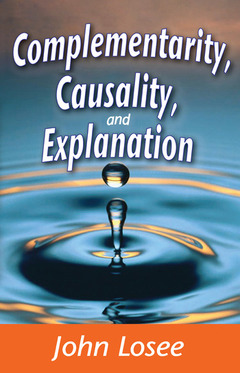Description
Complementarity, Causality and Explanation
Coordinator: Losee John
Language: English
Subjects for Complementarity, Causality and Explanation:
Keywords
Pictorial Level Interpretations; John Losee; Constant Sequential Conjunction; Copenhagen Interpretation; Classical Electrodynamic Theory; Spatiotemporal Description; Asymptotic Agreement; Quantum Realm; Kinetic Molecular Theory; Particle Pictures; Subject Object Boundary; Bohr’s Position; Objective Empirical Knowledge; Quantum Phenomena; Common Language; Wave Picture; Quantum Mechanical Systems; Spin Direction; Classical Physics; Quantum Systems; Bohr Sommerfeld Theory; Immutable Attributes; Vitalistic Interpretations; Orbital Angular Momentum; Counterfactual Dependence; Single Slit Diffraction
Publication date: 05-2013
Support: Print on demand
Publication date: 10-2017
· 15.2x22.9 cm · Paperback
Description
/li>Contents
/li>Biography
/li>
Philosophers have discussed the relationship of cause and effect from ancient times through our own. Prior to the work of Niels Bohr, these discussions presupposed that successful causal attribution implies explanation. The success of quantum theory challenged this presupposition. Bohr introduced a principle of complementarity that provides a new way of looking at causality and explanation.
In this succinct review of the history of these discussions, John Losee presents the philosophical background of debates over the cause-effect relation. He reviews the positions of Aristotle, Rene Descartes, Isaac Newton, David Hume, Immanuel Kant, and John Stuart Mill. He shows how nineteenth-century theories in physics and chemistry were informed by a dominant theory of causality and how specific developments in physics provided the background for the emergence of quantum theory.
Problems created for the "causality implies explanation" thesis by the emergence of quantum theory are reviewed in detail. Losee evaluates Bohr's proposals to apply a principle of complementarity within physics, biology, and psychology. He also discusses the feasibility of using complementarity as a principle of interpretation within Christian theology. This volume, which includes an in-depth index, is an essential addition to the libraries of advanced undergraduate and graduate students, philosophers, and those interested in causality and explanation.
Introduction
1The Causality-Explanation Connection from Aristotle to Mill
Aristotle
Bacon, Galileo, and Descartes
Newton
Hume
Kant
Mill
2Regularity between States of Physical Systems in the Nineteenth Century
Alternative Views of Newtonian Mechanics
Classical Thermodynamics
Kinetic Molecular Theory
Atomic Theory
Electromagnetic Theory




